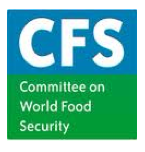The High Level Panel of Experts on Food Security and Nutrition (HLPE), which advises the Committee on World Food Security (CFS), has closed its e-consultations on early versions of two reports related to biofuels and to smallholder farmers.
 30 January 2013: The High Level Panel of Experts on Food Security and Nutrition (HLPE), which advises the Committee on World Food Security (CFS), has closed its e-consultations on early versions of two reports related to biofuels and to smallholder farmers.
30 January 2013: The High Level Panel of Experts on Food Security and Nutrition (HLPE), which advises the Committee on World Food Security (CFS), has closed its e-consultations on early versions of two reports related to biofuels and to smallholder farmers.
The Biofuels and Food Security Report examines: national biofuel policies; new biofuel technologies; the relationship between biofuels, food prices, hunger and poverty; biofuels and land-use competition; and social impacts of biofuel development. The HLPE report, titled “Investing in smallholder agriculture for food and nutrition security,” focuses on: defining the diversity of smallholder agriculture producers; describing their significance from social, cultural and economic perspectives; developing a framework for smallholder investments; outlining constraints to investments; and identifying priorities.
The biofuels report focuses on the food security implications of global and national biofuel markets, underscoring that if 10 per cent of global transport fuels were derived from biofuels, they would absorb 26 per cent of all crop production. It describes the domination of EU, Brazil and US biofuel policy on global demand, but underscores that more than 50 countries have biofuel policies and legislation. The paper highlights the strong role of agricultural and agro-industrial lobbies in biofuel policy and the changing role of civil society organizations in many countries from general support to a more cautious skepticism. It highlights the work of the Food and Agriculture Organization of the UN (FAO) Bioenergy and Food Security Project (BEFS), which has developed an analytical framework around the reasons for developing biofuels. Describing the difference between first, second and third generation of biofuels, the paper notes the emerging concept of “flexible agricultural products,” whereby crops can be used for different purposes (food, energy, etc.) depending on demand. The paper outlines the conditions whereby biofuels cause poverty and can exacerbate malnutrition, and also notes the link between oil prices and corn prices. It underscores that the link between biofuels and land-grabbing will remain strong due to increased global food and agricultural product demand, as well as other land-use pressure globally. It also calls for measures to encourage responsible investment. The report concludes that, despite these challenges, negative and unintended consequences of biofuel investment can be mitigated when biofuels are conceived as part of the broader development of bioenergy for rural development.
The paper on smallholder investment describes smallholder farmers as having small resource bases, which are often inadequate to support livelihoods. It nevertheless, stresses that these farmers are very frequently integrated into markets and that they are the largest global provider of food. It underscores constraints to investment related to low income, high level of risks, poor investment environment and the institutional weakness of smallholder collectives. The paper calls for the integration of smallholder concerns into national and international agricultural policy dialogues, and for the need to better understand the actual and potential contributions of smallholders within large agricultural production systems. It highlights the coordination challenges associated with organizing smallholder production and the need for greater political support.
The paper also calls for National Smallholder Vision and Strategic Frameworks, which consider the different agricultural structures within countries. In addition, it presents a series of recommendations around assets, markets and institutions, all of which center on the pillars of: ensuring social protection and public goods; developing market infrastructure; and building technical and organizational capacity. [HLPE e-Consultations] [HLPE Publication: Biofuels and Food Security] [HLPE Publication: Investing in smallholder agriculture for food and nutrition security]